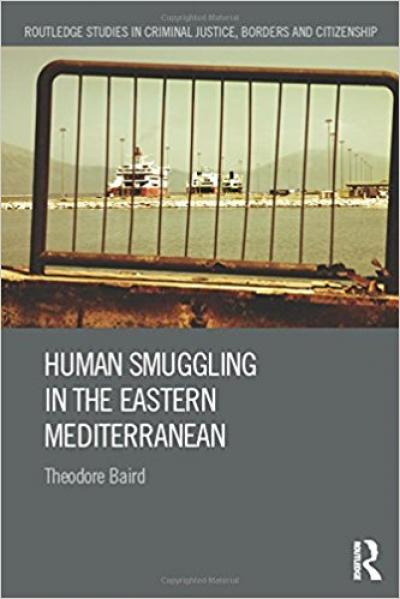Guest post by Reiko Okazaki, Lecturer and Teaching Associate at Monash University in Melbourne, Australia. Reiko is a barrister and mediator at the Victorian Bar, and an Attorney-at-law in the State of New York. She serves as General Manager of the independent media organisation Right Now Inc.
Review of Human Smuggling in the Eastern Mediterranean, by Theodore Baird (Routledge, 2017).

In Human Smuggling in the Eastern Mediterranean Theodore Baird refutes popular and political misconceptions of human smuggling through a theoretical analysis of empirical material on the lived experiences of migrants and their mobility intermediaries. At times confused with trafficking, human smuggling refers to the facilitation of voluntary unauthorised movement across international borders. Baird treats this practice not as a pre-existing legal category but as one arising from borders themselves, their enforcement and broader social causes. Baird sets the tone of his argument by questioning current discourses that place people in opposition to borders, and makes a humanitarian case for a highly stigmatised segment of the world’s population: undocumented migrants and those who assist them in an attempt to survive and reach a safe port.
Between 2010 and 2014, Baird conducted extensive ethnographic research among migrants and smuggling facilitators in cities across Turkey and Greece. Through day to day interactions in streets, open spaces and migrant enclaves, he encountered refugees forced out of Syria, as well as refugees and migrants arriving from Libya where many had spent considerable amounts of time after leaving their countries of origin elsewhere in the Middle East and Africa. Countries around the world entrust problematic regimes with the task of fulfilling border security and migration enforcement needs. These political decisions in turn shift the movement of people into risky sea routes and long land crossings. Baird’s book demonstrates how human smuggling emerges and is shaped by these diverse tensions in geopolitics amid the neoliberal state transformation. In this sense, Baird also joins a growing number of critical criminologists and migration scholars who have argued human smuggling, while often presented as an organised criminal enterprise, stands instead as a set of ad hoc alliances built by migrants and their communities to secure their own transits amid the multi-level power dynamics that seek to curtail migration flows.
The testimonies included in this book further confirm that despite facing untold levels of precariousness, migrants participating in the clandestine market of mobility have leverage to negotiate the terms of their transport. At the same time, migrants’ reluctance to demonize smugglers (who are many times migrants themselves) complicates our understanding of victimisation, further suggesting that the forms of violence and/or abuse migrants systematically face occur at the hands not of organized crime alone but of state actors.
Unlike smuggled funds or goods, humans exercise agency. Sometimes those labelled as smugglers are simply people exercising their own right to mobility, or helping extended relatives and acquaintances do the same. The dominant discourse of the migrant smuggler as a transnational male predator and the migrant as a weak and assailable body has, however, greater impact because it mimics the official rhetoric of organized crime, under which characterizations of men of colour as foreign criminal elements infiltrating national borders resonates with larger messages of invasion and mafias. In truth, Baird reminds us, people are propelled to move without formal documentation in desperate times.
This book presents a fascinating and well discussed account of human smuggling in the Mediterranean. It will be of interest to practitioners, academics and activists working in the field of border control and migrant protection exploring the Mediterranean routes and their social dynamics, and for those seeking to understand critical, empirical and theoretical debates on the facilitation of irregular migration worldwide.
Any comments about this post? Get in touch with us! Send us an email, or post a comment here or on Facebook. You can also tweet us.
__________
How to cite this blog post (Harvard style)
Okazaki, R. (2018) Book Review: Human Smuggling in the Eastern Mediterranean. Available at: https://www.law.ox.ac.uk/research-subject-groups/centre-criminology/centreborder-criminologies/blog/2018/06/book-review-human (Accessed [date]).
Share:








